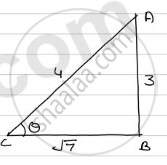Advertisements
Advertisements
Question
if `sin theta = 3/4` prove that `sqrt(cosec^2 theta - cot)/(sec^2 theta - 1) = sqrt7/3`
Solution
We have `sin theta = 3/4`

In ΔABC
`AC^2 = AB^2 + BC^2`
`=> (4)^2 = (3)^2 + BC^2`
`=> BC^2= 16 - 9`
`=> BC^2 = 7`
`=> BC = sqrt7`
`:. cosec theta = 4/3, sec theta = 4/sqrt7 and cot theta = sqrt7/3`
Now
L.H.S `sqrt((cosec^2 theta - cot^2 theta)/(sec^2 theta - 1))`
`= sqrt(((4/3)^2 - (sqrt7/3)^2)/((4/sqrt7)^2 - 1)`
`= sqrt((16/9 - 7/9)/(16/7 - 1)`
`=sqrt((9/9)/((16 - 7)/7 ))`
`= sqrt(7/9)`
`= sqrt7/3`
= R.H.S
APPEARS IN
RELATED QUESTIONS
Prove that `(sin "A" - 2sin^3 "A")/(2cos^3 "A" - cos "A") = tan "A"`
In the following, one of the six trigonometric ratios is given. Find the values of the other trigonometric ratios.
`tan theta = 8/15`
In the following, trigonometric ratios are given. Find the values of the other trigonometric ratios.
`cosec theta = sqrt10`
If `tan theta = 24/7`, find that sin 𝜃 + cos 𝜃
If `sin theta = a/b` find sec θ + tan θ in terms of a and b.
Find the value of x in the following :
cos 2x = cos 60° cos 30° + sin 60° sin 30°
If cosec θ - cot θ = `1/3`, the value of (cosec θ + cot θ) is ______.
If cos (81 + θ)° = sin`("k"/3 - theta)^circ` where θ is an acute angle, then the value of k is ______.
If sin A = `1/2`, then the value of cot A is ______.
If f(x) = `3cos(x + (5π)/6) - 5sinx + 2`, then maximum value of f(x) is ______.
